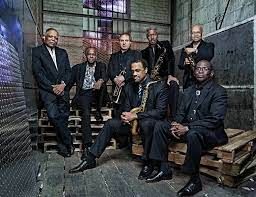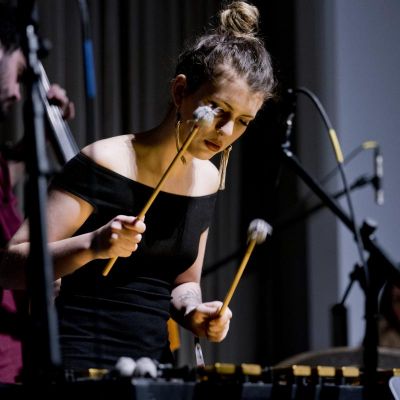Home > Jazz / Blues
02/28/2022
The Cookers at the Alberta Rose Theatre 2-22-2/Sasha Berliner at Jack London Revue 2-23-22
By MICHAEL SHOEHORN CONLEY // Two Festival concerts, The Cookers on 2-22-22 at Alberta Rose and Sasha Berliner 2-23-22 at Jack London Review.
Part 1) The Cookers at the Alberta Rose Theater:
The Cookers kicked off their set at the Alberta Rose with a slow bluesy fanfare by the horns, with the rhythm section playing more in the vein of the classic Coltrane quartet. When one thinks of all-star jazz groups, one might expect to hear some songbook standards, rendered in a classic style. The Cookers played a set of tunes written by members of the group, save the closer, Freddie Hubbard’s “The Core”. Bassist Cecil McBee, pianist George Cables and tenor saxophonist Billy Harper all contributed originals to the set.
The first tenor solo by Billy Harper displayed a willingness to take chances to get to the good stuff he wanted us to hear, flurries of notes flowing with abandon, with shades of Coltrane and Pharoah Sanders informing his potent sound. Next, band leader David Weiss took a hot trumpet solo, playing with a solid tone that rang true at even at the fastest subdivisions.
McBee, The Cookers’ elder statesman, soloed on his own tune, The Peacemaker. At age 86, he has plenty left to say, and retains all the facility required to say it, providing a huge, muscular core to the group’s identity, with no sign of strain. His importance as the linchpin of this group cannot be overstated.
“The Peacemaker” also featured an alto sax solo by Craig Handy, involving some very high altissimo notes and a ferocious attack. Handy appeared serene and happy, and vaguely clerical, wearing a gray smock with a long beard and horn-rim glasses, and he smiled frequently.
We heard another piece from Billy Harper titled “Croquet Ballet”– when the song was announced it drew an enthusiastic “oh yeah!” from an audience member in the back of the house. This one was a very groovy mid-tempo number, Billy Hart’s drums were on fire, and Handy delivered a tour-de-force alto solo.
The second set started with a George Cables composition titled “The Mystery of Monifa Brown”. The tune was set up by the pianist with a brief, moody series of chords before he kicked off tempo for the band to come in, sporting a very sophisticated rhythm arrangement. Hart was lighting fires on this one, which is on their new album, coming out soon. Cables’ own solo turn generated a big audience reaction.
Next we got a ballad, “If One Could Only See” featuring Eddie Henderson. This tune had a bit of a “Feels so Good” vibe in the optimism and mood in its melody, but it developed into Henderson having a cinematic moment– he was painting pictures for us. Cables was virtuosic but loose on this one. The best moment for us to really get what Eddie Henderson is all about was in his beautiful unaccompanied cadenza, which revealed the trumpeter's tone and taste in a way we could not hear during ensemble passages.
The band closed with “The Core” by Freddie Hubbard. This was where Billy Hart took his drum solo, setting up melodic phrases on his toms in a call-and-response with his snare and floor tom. Hart played fairly busy and aggressive throughout the concert, at times calling to mind Elvin Jones and Tony Williams, but this drum solo demonstrated other aspects of his musicianship.
The band maintained a consistent style throughout the show. These men were young in the 1960's and 70's, and one can hear traces of the music of that era in their compositions and arrangements.
This show at the Alberta Rose was very well attended and the sound was excellent. As a saxophone player myself what stood out most was the two saxophonists’ willingness to experiment and push their abilities– that's inspiring to me, especially Handy’s several solos demonstrating superior chops and range, all delivered with his tasty tonal concept.
Part 2) Sasha Berliner Quartet at Jack London Revue:
The following night I attended Sasha Berliner’s show at Jack London Revue. Taking the stage with her quartet, the 23 year old vibraphonist embarked on an extended unaccompanied intro, starting with a looped phrase, and built on it for a few minutes before being joined by the bass and keyboards. After the group energy surged, eventually the other players dialed back the intensity, leaving Berliner to close with the original loop.
The next tune was set up with a four-mallet section by the leader, giving way to a powerful keyboard solo by Paul Cornish, which ramped-up in volume and energy with drummer Jonathan Pinson as the rest of the band matched the intensity generated. Berliner told us that we are among the first people to hear this tune, which will be coming out on her next album.
The following number also started with a chiming four-mallet intro, which also served as an interlude between the solos. Once the actual melody started we could hear that it was an abstraction of the Cole Porter standard “Night and Day”. This tune has long been a favorite of improvisers but is more often done as a Bossa or a ballad. Here it got an up-tempo treatment with an intense upright piano solo by Cornish, full of ferocious rhythm. After playing the interlude again the leader took her own vigorous solo over the form, which culminated in some very hot 8-bar trades with the drummer. Wow!
Next we got a Berliner original titled “Reasons” which featured some wonderful, complex spiraling phrases from the vibraphonist This one was played at about 240 beats per minute, and they didn't slow down for the bass solo by Max Gerl.
The ballad “Stinson”, was dedicated to the composer's parents and her childhood in Northern California. Berliner, wearing leather pants and boots and a knee-length black and white coat, with her hair up, and giant colored hoop earrings, mentioned her mother was an artist from whom she got her fashion sense!
This one had an internal answering phrase where Berliner would hit an arpeggio in the low register and then answer it with runs through the rest of keys. Although this was a ballad, once Cornish got a hold of it, starting with just one hand, it built to an astonishing rhythmic density.
Berliner mentioned that her album’s release was delayed by supply chain issues but “Onyx” will be released on vinyl this summer. She played the song titled “Jade” here, Cornish employing a keyboard sound that contrasted to the fixed pitch of the vibraphone with a spacey decay similar to old-school analog synths, and Max Gerl played a 7-string electric bass.
Berliner introduced the next tune as a standard, coyly omitting the title, but after another beautifully arranged intro, the melody and form of “My Funny Valentine” was revealed. One unusual element of this arrangement was using only the first couple of bars of the bridge for the vibes solo, with Cornish eventually coming in for a solo on the last eight, leading to an up-tempo shred on vibes from the leader.
This being a short club set, it was time to go, but the audience demanded an encore from the young virtuoso and another original ensued, titled “Construction”, based on a B-flat pedal tone. I can't emphasize enough how impressive these musicians were. Cornish, only 25, arrives with a fully-formed concept, and his influences are vested rather than openly displayed. On this tune his hyperactive attack sounded like an unusual paraphrase, or parody perhaps, of a montuno piano part, one hand on the electric keyboard, the other on the piano.
Unlike most acts featuring a vibraphone, this band does not traffic in Latin or swing conventions, even though drummer Pinson played various polyrhythmic fusion grooves, and some of the melodies reminded me of Chick Corea's work with tricky rhythm parts like the famous break on “Spain”.








